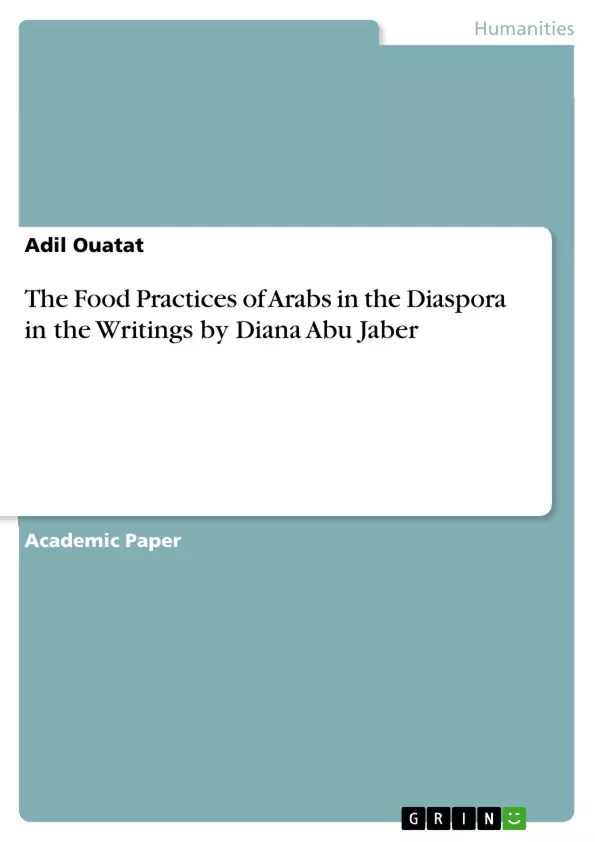The Arab-American Literature is considered as one of major ethnic literary framework in the United States. This literary tradition deploys the cultural issues to negotiate how Arabs discuss their existence in Diasporic milieu and how these cultural tropes as food become a trope of multiculturalism and radical empathy of hyphenated identities in the host-land.
In the context of Arab-American immigrants in the U.S., there is great interest and recognition of passion related to preparing, eating, and consuming food. Thus, many studies attempt to raise questions about the different meanings and roles of Arab food and foodways in the diaspora. Similarly, many writers and scholars provide a range of perspectives on food, culture, and identity in the United States.
Inhaltsverzeichnis (Table of Contents)
- The Foodways Practices of Arabs Diaspora in the Writings of Diana Abu Jaber
- Trans-culturalism in Diana Abu-Jaber's Writings
- Food as a Cultural Trope
- Food and Identity
- Food and Exile
- Food as a Link to the Homeland
- Food and Memories
- Food and Love
- Food and the Immigrant Experience
Zielsetzung und Themenschwerpunkte (Objectives and Key Themes)
This paper explores the role of food in the writings of Arab-American author Diana Abu-Jaber, specifically focusing on how food serves as a cultural trope and a vehicle for exploring themes of trans-culturalism, identity, and exile. The work analyzes how Abu-Jaber utilizes food references to depict the lives of Arab-Americans and their experiences in the in-betweenness of cultures, showcasing how food allows them to navigate their dual heritage and the pressures of assimilation.
- The use of food as a cultural trope in Arab-American literature
- The role of food in negotiating trans-cultural identities
- The connection between food and memories of the homeland
- The impact of exile and immigration on the meaning of food
- Food as a symbol of love and connection in Arab-American culture
Zusammenfassung der Kapitel (Chapter Summaries)
- The Foodways Practices of Arabs Diaspora in the Writings of Diana Abu Jaber: This section introduces the concept of Arab-American literature and the significance of food as a cultural trope in exploring immigrant experiences. It highlights the interest in understanding the various meanings and roles of Arab food and foodways in the diaspora.
- Trans-culturalism in Diana Abu-Jaber's Writings: This section explores how Abu-Jaber utilizes food references to showcase the clashing cultures and transcultural experiences of Arab-Americans in the United States. It emphasizes how food serves as a tool for understanding the complexities of navigating dual heritages.
- Food as a Cultural Trope: This section analyzes how Abu-Jaber's writings utilize food motifs to highlight the diversity of contemporary discourse on culture and identities in multicultural environments. It emphasizes the ability of food to serve as a transcultural motif.
- Food and Identity: This section focuses on how Abu-Jaber's characters use food to negotiate their identities and cope with the challenges of belonging in a new culture. It explores the struggles of Arab immigrants to create alternative identities and the role of food in this process.
- Food and Exile: This section examines how food serves as a link to the homeland for exiled characters in Abu-Jaber's writings. It explores how food acts as a mirror reflecting both the joy and pain of leaving one's homeland and the constant pressure to assimilate in a new culture.
- Food as a Link to the Homeland: This section explores the role of food in preserving cultural heritage and memories of the homeland for Arab immigrants. It examines how preparing and consuming ethnic food in the diaspora serves as a way to maintain connections to their past.
- Food and Memories: This section analyzes the relationship between food and memories in Abu-Jaber's writings, highlighting how food acts as a trigger for recalling childhood memories, traditions, and the social fabric of the Arab world. It emphasizes the importance of food in shaping individual and collective identities.
- Food and Love: This section explores the symbolic significance of food in representing love, connection, and intimacy within Arab-American culture. It analyzes how food acts as a means of expressing affection and forging bonds between people.
Schlüsselwörter (Keywords)
The key terms and concepts explored in this paper include: Arab Diaspora, United States, cultural trope, food, host-land, trans-culturalism, identity, exile, immigrant experience, assimilation, Arab-American literature, Diana Abu-Jaber, Baklava, knaffea, liminality, dual heritage, multiculturalism.
- Quote paper
- Adil Ouatat (Author), 2022, The Food Practices of Arabs in the Diaspora in the Writings by Diana Abu Jaber, Munich, GRIN Verlag, https://www.grin.com/document/1308642




